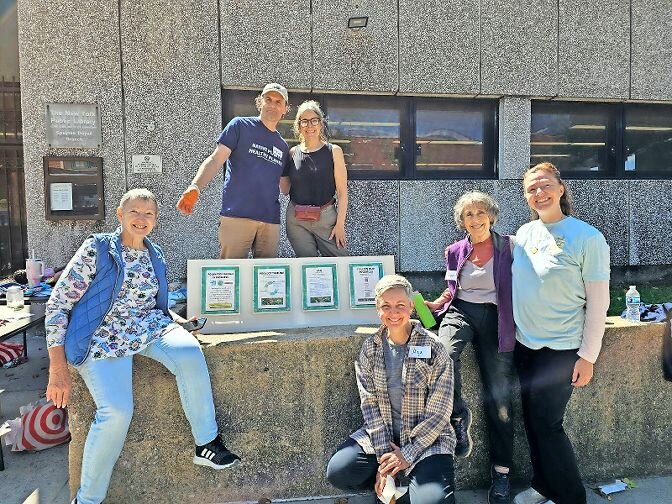Community efforts flourish as Spuyten Duyvil Library unveils new native plant garden
Last weekend at the Spuyten Duyvil Library, a new native plant garden came to life, thanks to the efforts of many young volunteers fueled by cider and donuts.
Organized by Plant Native NW Bronx, an all-volunteer group, the project was completed hours ahead of schedule.
Plant Native NW Bronx, founded in 2021, was created in response to growing concerns among Riverdale residents about climate change and environmental justice.
Ann Lane, a resident of Northern Riverdale, recalled how a neighbor invited her to an environmental fair at the Riverdale Y Sunday Market, hosted by Rick Feldman of Art for Aid.
“I was really moved seeing so many people in Riverdale working to improve the environment,” Lane said, “composting, talking about ecological restoration, and getting involved with local officials to push for things like electric vehicle charging stations and reducing fossil fuel dependency.”
This experience prompted Lane to gather local environmental advocates for a Zoom meeting in which they discussed how Riverdale could take a more active role in environmental stewardship.
Out of those conversations, Plant Native NW Bronx was born.
Lane said they all agreed focusing on biodiversity and climate through native plants made sense and felt like the right path forward.
According to Lane, the more people connected with nature, the better they felt. Engaging with their environment lessened anxiety about the climate crisis, and many became more motivated to play an active role in protecting it. This new engagement also sparked interest among some in contacting local elected officials to support environmental initiatives.
The group began with webinars and educational programs to introduce the concept of restoring local ecosystems with native plants, and the response was enthusiastic. One of the group’s core goals is to encourage people to think more deeply about their role in the climate and ecological justice movements. As people learned more, they embraced the idea of supporting pollinators and creating habitat corridors to connect Riverdale’s isolated green spaces.
Lane said the idea behind a pollinator pathway: landowners, schools, apartment buildings, and terraces can all contribute by planting native species to replace what urbanization has taken away. Last autumn, another volunteer, Henriet Cohen, oversaw a project in which high school students planted milkweed and other pollinator-friendly plants along Independence Avenue.
For a long time, Plant Native NW Bronx searched for a location at which they could establish a wildflower garden and demonstrate the benefits of native planting to the public. In the past, they donated seeds to Ewen Park and shared plants with the Riverdale Neighborhood House as part of the mission to spread resources and knowledge throughout the community.
The Spuyten Duyvil Library native plant garden was funded by a $2,000 grant from Citizens Committee NYC. According to Lane, partnering with the library— the Bronx’s most frequented—was a natural fit. Over the past year, the group had already hosted several successful native plant-themed events for children, as well as a discussion with Tim Wheeler, a former horticulturist at Wave Hill.
This year’s project at the library expands on another project last year by the Friends of Spuyten Duyvil, called the Library Street Tree Habitat project. Native plant beds were planted and cared for in collaboration with NYC parks, with data from this community science research project used to determine which native species are best suited for future tree bed plantings.
Looking ahead, the group aims to educate the community on how to create what renowned ecologist Doug Tallamy calls a “homegrown national park” — a collective effort to restore the natural environment by utilizing public and private land to reconnect ecosystems.
In addition, Plant Native NW Bronx seeks to raise awareness about the impact of invasive species like English ivy and Norway maple, which disrupt local ecosystems by altering soil conditions. Lane hopes, with more education, residents will opt for native species instead of these popular yet harmful plants.
Last weekend, Hawthorne’s 140-year-old Rosedale Nurseries hosted its 15th annual Native Plant Weekend to benefit the Native Plant Center. According to William New, they witnessed the second-largest turnout in the event’s history, rivaling the peak during covid.
“Customers are really catching on to the importance and beauty of native plants,” New said, “and are increasingly asking for them.”
Patty Butter, an educator at the Native Plant Center also present at the event, said the most popular native plant people seek out for their gardens is typically milkweed. Monarch butterflies, which depend on the plant, are a charismatic species people are excited to see in their yards, which often can open the door to learning more about the relationships between insects and plants.
“There’s a mindset shift happening,” Lane said, comparing the traditional manicured lawn to fur coats, which once signified status but are now often viewed as outdated or even cruel. She believes the modern landscaped lawn is less about status and more about belonging, and she sees the potential for people to embrace new ways of stewarding their green spaces.
After discussing the issue with neighbors at her own Riverdale Park Apartments, where invasive plants like burning bush dominate the landscaped areas, Lane found many residents felt their lawns represented a sense of community.
“If the lawn wasn’t cared for, they felt disconnected or out of place,” she said.
Despite this attachment to traditional landscaping, Lane said the key lies in openness to change.
“People have to be willing to do things differently,” she said.
Even in urban areas, there are always opportunities to live more in harmony with nature. Although bees may not be everyone’s ideal neighbors, Lane emphasized the importance of supporting pollinators.
“We have to celebrate what nature does for us,” she said. “It does everything.”






